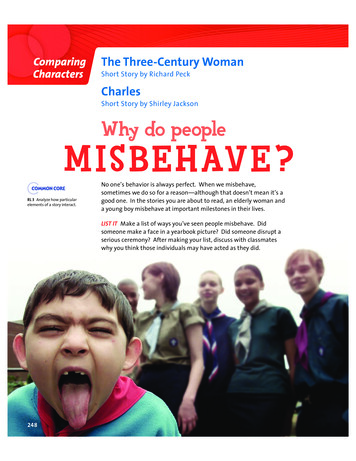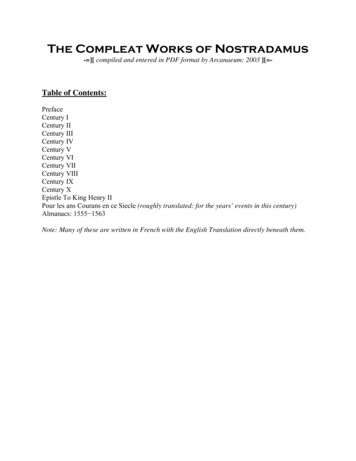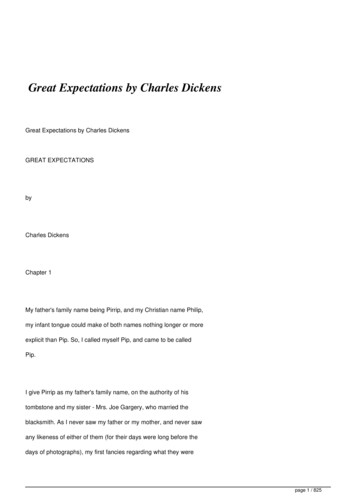
Transcription
ComparingCharactersThe Three-Century WomanShort Story by Richard PeckCharlesShort Story by Shirley JacksonWhy do peopleMISBEHAVE?RL 3 Analyze how particularelements of a story interact.No one’s behavior is always perfect. When we misbehave,sometimes we do so for a reason—although that doesn’t mean it’s agood one. In the stories you are about to read, an elderly woman anda young boy misbehave at important milestones in their lives.LIST IT Make a list of ways you’ve seen people misbehave. Didsomeone make a face in a yearbook picture? Did someone disrupt aserious ceremony? After making your list, discuss with classmateswhy you think those individuals may have acted as they did.248248-249 NA L07PE-u02s4-brChar.indd 2481/8/11 12:33:36 AM
Meet the Authorstext analysis: character motivationSome of the most distinctive details in a story are those thatreveal a character’s traits and motivations, or the reasonsbehind his or her behavior. These details can drive a plot,as a character creates or reacts to events. To figure out acharacter’s motivation, consider story details like these: the narrator’s direct comments about a character’smotivation a character’s actions and thoughts what matters to a characterAs you read the following two stories, note what thecharacters say and do and how their motivations affect theevents of the plot.reading strategy: set a purpose for readingTo set a purpose for reading, you choose specific reasonsto read. As you read “The Three-Century Woman” and“Charles,” find similarities and differences between the twomain characters. Fill in the chart after you finish each story.Great-GrandmaLaurieWhat does each characterthink, say, and do?How do other charactersreact to each character?How would you describe eachcharacter’s motivation?Review: Make Inferencesvocabulary in contextThe listed words help reveal the characters’ personalities. Foreach word, choose the numbered term closest in meaning.wordlistcynicallyincredulously1. noisy2. disrespectfullyinsolentlyraucous3. sarcastically4. skepticallyrenouncevenerable5. well-respected6. give upComplete the activities in your Reader/Writer Notebook.Richard Peckborn 1934Inspired TeacherTeaching high schoolEnglish brought out thewriter in Richard Peck.As he says, “I found myfuture readers rightthere in the roll book.”Although Peck has writtennovels for adults, heis best known andloved for his youngadult fiction.Shirley Jackson1919–1965Rebel with a CauseFrom an early age, Shirley Jacksonrebelled against what she consideredher wealthy family’s selfish lifestyle.Instead of taking part in social events,she would disappear into her journals.After she married, Jackson moved to asmall town in Vermont and adopteda much different way of life.She wrote many novels,essays, and short stories.Jackson’s friends andcritics described thereclusive author as the“Madame of Mystery,”referring to the darkhumor and strange twistsfound in her stories.Sadly, Jackson died at45 from a heart attack.Authors OnlineGo to thinkcentral.com. KEYWORD: HML7-249249248-249 NA L07PE-u02s4-brChar.indd 2491/8/11 12:33:43 AM
Three-CenturyThe!oman1020guess if you live long enough,” my mom said to Aunt Gloria, “youget your fifteen minutes of fame.”Mom was on the car phone to Aunt Gloria. The minute Mom rolls outof the garage, she’s on her car phone. It’s state of the art and better thanher car.We were heading for Whispering Oaks to see my Great-GrandmotherBreckenridge, who’s lived there since I was a little girl. They call it anElder Care Facility. Needless to say, I hated going.The reason for Great-Grandma’s fame is that she was born in 1899.Now it’s January 2001. If you’re one of those people who claim the newcentury begins in 2001, not 2000, even you have to agree that GreatGrandma Breckenridge has lived in three centuries. This is her claimto fame.We waited for a light to change along by Northbrook Mall, and I gazedfondly over at it. Except for the Multiplex, it was closed because of NewYear’s Day. I have a severe mall habit. But I’m fourteen, and the mall isthe place without homework. Aunt Gloria’s voice filled the car. a“If you take my advice,” she told Mom, “you’ll keep those WhisperingOaks people from letting the media in to interview Grandma. Interviewher my foot! Honestly. She doesn’t even know where she is, let alone howmany centuries she’s lived in. The poor old soul. Leave her in peace.She’s already got one foot in the—”“Gloria, your trouble is you have no sense of history.” Mom gunnedacross the intersection. “You got a C in History.”“I was sick a lot that year,” Aunt Gloria said.“Sick of history,” Mom murmured.250unit 2: analyzing character and point of view250-256 NA L07PE-u02s4-Woman.indd 250Richard PeckWhat can you inferabout the personalityof the woman in the redhat on the basis of herappearance?aCHARACTERMOTIVATIONReread lines 14–17. Whatdo you learn about thenarrator here?Red Hat (2003), Deidre SchererFabric and thread. Deidre Scherer.1/8/11 12:34:16 AM
Comparing Characters250-256 NA L07PE-u02s4-Woman.indd 2511/13/11 1:39:19 AM
30405060“I heard that,” Aunt Gloria said.They bickered on, but I tuned them out. Then when we turned in atWhispering Pines, a sound truck from IBC-TV was blocking the drive.“Good grief,” Mom murmured. “TV.”“I told you,” Aunt Gloria said, but Mom switched her off. She parkedin a frozen rut.“I’ll wait in the car,” I said. “I have homework.”“Get out of the car,” Mom said.f you get so old you have to be put away, Whispering Oaks isn’t thatbad. It smells all right, and a Christmas tree glittered in the lobby.A real tree. On the other hand, you have to push a red button to unlockthe front door. I guess it’s to keep the inmates from escaping, thoughGreat-Grandma Breckenridge wasn’t going anywhere and hadn’t fortwenty years.When we got to her wing, the hall was full of camera crews anda woman from the suburban newspaper with a notepad.Mom sighed. It was like that first day of school when you thinkyou’ll be okay until the teachers learn your name. Stepping over a cable,we stopped at Great-Grandma’s door, and they were on to us.“Who are you people to Mrs. Breckenridge?” the newspaperwomansaid. “I want names.”These people were seriously pushy. And the TV guy was wearing moremakeup than Mom. It dawned on me that they couldn’t get into GreatGrandma’s room without her permission. Mom turned on them. b“Listen, you’re not going to be interviewing my grandmother,” she saidin a quiet bark. “I’ll be glad to tell you anything you want to know abouther, but you’re not going in there. She’s got nothing to say, and . . . sheneeds a lot of rest.”“Is it Alzheimer’s?”1 the newswoman asked. “Because we’re thinkingAlzheimer’s.”“Think what you want,” Mom said. “But this is as far as you get.And you people with the camera and the light, you’re not going in thereeither. You’d scare her to death, and then I’d sue the pants off you.” cThey pulled back.But a voice came wavering out of Great-Grandma’s room. Quite aneerie, echoing voice.“Let them in!” the voice said.Language CoachHomonyms Words thathave the same spellingand sound but havedifferent meanings arecalled homonyms. In line41, the word wing means “astructure connected to theside of a main building.”What other meaning doyou know for wing?bCHARACTERMOTIVATIONReread lines 41–50. Thenarrator characterizesthe news people as“seriously pushy.”Which of their actionsor words led to thisdescription?cCHARACTERMOTIVATIONReread lines 51–59.What do you learn aboutthe narrator’s motherfrom how she talks tothe reporters?1. Alzheimer’s (ältsPhF-mErz): a disease of the brain that causes confusion and may lead to total lossof memory.252unit 2: analyzing character and point of view250-256 NA L07PE-u02s4-Woman.indd 2521/8/11 12:34:24 AM
Comparing Characters708090100It had to be Great-Grandma Breckenridge. Her roommate had died.“Good grief,” Mom murmured, and the press surged forward.Mom and I went in first, and our eyes popped. Great-Grandma wasusually flat out in the bed, dozing, with her teeth in a glass and a bookin her hand. Today she was bright-eyed and propped up. She wore a fuzzypink bed jacket. A matching bow was stuck in what remained of her hair.“Oh for pity’s sake,” Mom murmured. “They’ve got her done up likea Barbie doll.”Great-Grandma peered from the bed at Mom. “And who are you?”she asked.“I’m Ann,” Mom said carefully. “This is Megan,” she said, meaning me.“That’s right,” Great-Grandma said. “At least you know who you are.Plenty around this place don’t.”The guy with the camera on his shoulder barged in. The other guyturned on a blinding light.Great-Grandma blinked. In the glare we noticed she wore a trace oflipstick. The TV anchor elbowed the woman reporter aside and stucka mike in Great-Grandma’s face. Her claw hand came out from underthe covers and tapped it.“Is this thing on?” she inquired.“Yes, ma’am,” the TV anchor said in his broadcasting voice. “Don’t youworry about all this modern technology. We don’t understand half of itourselves.” He gave her his big, five-thirty news smile and settled on theedge of her bed. There was room for him. She was tiny. d“We’re here to congratulate you for having lived in three centuries—for being a Three-Century Woman! A great achievement.”Great-Grandma waved a casual claw. “Nothing to it,” she said.“You sure this mike’s on? Let’s do this in one take.”The cameraman snorted and moved in for a closer shot. Mom stoodstill as a statue, wondering what was going to come out of GreatGrandma’s mouth next. e“Mrs. Breckenridge,” the anchor said, “to what do you attribute yourlong life?”“I was only married once,” Great-Grandma said. “And he died young.”The anchor stared. “Ah. And anything else?”“Yes. I don’t look back. I live in the present.”The camera panned around the room. This was all the present she had,and it didn’t look like much.“You live for the present,” the anchor said, looking for an angle,“even now?”dCHARACTERMOTIVATIONWhy is the TV anchorbeing so friendly?eMAKE INFERENCESReread lines 77–94. Howdo you think Megan feelsabout the reporters?the three-century woman250-256 NA L07PE-u02s4-Woman.indd 2532531/8/11 12:34:25 AM
110120130140Great-Grandma nodded. “Something’s always happening. Last nightI fell off the bed pan.”Mom groaned.The cameraman pulled in for a tighter shot. The anchor seemed tosearch his mind. You could tell he thought he was a great interviewer,though he had no sense of humor. A tiny smile played around GreatGrandma’s wrinkled lips.“But you’ve lived through amazing times, Mrs. Breckenridge. And younever think back about them?” fGreat-Grandma stroked her chin and considered. “You mean you wantto hear something interesting? Like how I lived through the San Franciscoearthquake—the big one of oh-six?”Beside me, Mom stirred. We were crowded over by the dead lady’s bed.“You survived the 1906 San Francisco earthquake?” the anchor said.Great-Grandma gazed at the ceiling, lost in thought.“I’d have been about seven years old. My folks and I were staying atthat big hotel. You know the one. I slept in a cot at the foot of their bed.In the middle of the night, that room gave a shake, and the chiffonierwalked right across the floor. You know what chiffonier is?”“A chest of drawers?” the anchor said.“Close enough,” Great-Grandma said. “And the pictures flapped onthe walls. We had to walk down twelve flights because the elevators didn’twork. When we got outside, the streets were ankle-deep in broken glass.You never saw such a mess in your life.”Mom nudged me and hissed: “She’s never been to San Francisco.She’s never been west of Denver. I’ve heard her say so.”“Incredible!” the anchor said.“Truth’s stranger than fiction,” Great-Grandma said, smoothing her sheet.“And you never think back about it?”Great-Grandma shrugged her little fuzzy pink shoulders. “I’ve beenthrough too much. I don’t have time to remember it all. I was on theHindenburg when it blew up, you know.”Mom moaned, and the cameraman was practically standing on hishead for a close-up.“The Hindenburg?”“That big gas bag the Germans built to fly over the Atlantic Ocean.It was called a zeppelin. Biggest thing you ever saw—five city blocks long.It was in May of 1937, before your time. You wouldn’t remember. Myhusband and I were coming back from Europe on it. No, wait a minute.”Great-Grandma cocked her head and pondered for the camera.254fMAKE INFERENCESWhy do you think thereporter wants GreatGrandma to talk abouther memories?SOCIAL STUDIESCONNECTIONOn April 18, 1906, anearthquake devastatedSan Francisco, California.It is still considered oneof the worst naturaldisasters in the historyof the United States.unit 2: analyzing character and point of view250-256 NA L07PE-u02s4-Woman.indd 2541/8/11 12:34:25 AM
Comparing Characters150160170180“My husband was dead by then. It was some other man. Anyway, thetwo of us were coming back on the Hindenburg. It was smooth as silk.You didn’t know you were moving. When we flew in over New York, theystopped the ball game at Yankee Stadium to see us passing overhead.”Great-Grandma paused, caught up in memories.“And then the Hindenburg exploded,” the anchor said, prompting her.She nodded. “We had no complaints about the trip till then. Theluggage was all stacked, and we were coming in at Lakehurst, New Jersey.I was wearing my beige coat—beige or off-white, I forget. Then whoosh!The gondola2 heated up like an oven, and people peeled out of thewindows. We hit the ground and bounced. When we hit again, the doorfell off, and I walked out and kept going. When they caught up with mein the parking lot, they wanted to put me in the hospital. I looked downand thought I was wearing a lace dress. The fire had about burned up mycoat. And I lost a shoe.”“Fantastic!” the anchor breathed. “What detail!” Behind him thewoman reporter was scribbling away on her pad.“Never,” Mom muttered. “Never in her life.”“Ma’am, you are living history!” the anchor said. “In your sensationalspan of years you’ve survived two great disasters!”“Three.” Great-Grandma patted the bow on her head. “I told you I’dbeen married.”“And before we leave this venerable lady,” the anchor said, flashinga smile for the camera, “we’ll ask Mrs. Breckenridge if she has anypredictions for this new twenty-first century ahead of us here in theDawn of the Millennium.”“Three or four predictions,”Great-Grandma said, and pausedagain, stretching out her airtime.“Number one, taxes will behigher. Number two, it’s going tobe harder to find a place to park.And number three, a whole lotof people are going to live as longas I have, so get ready for us.”“And with those wise words,”the anchor said, easing off thebed, “we leave Mrs. Breck—”venerable(vDnPEr-E-bEl) adj.deserving respectbecause of age,character, or importanceWhat do you noticeabout the fabricpatterns used in thisquilt of the Hindenburg?2. gondola (gJnPdl-E): a car that hangs under anairship and contains equipment and controls.the three-century woman250-256 NA L07PE-u02s4-Woman.indd 2552551/8/11 12:34:30 AM
190200210“And one more prediction,” she said. “TV’s on the way out. Yournetwork ratings are already in the basement. It’s all websites now. Son,I predict you’ll be looking for work.”And that was it. The light went dead. The anchor, looking shaken,followed his crew out the door. When TV’s done with you, they’re donewith you. “Is that a wrap?” Great-Grandma asked.But now the woman from the suburban paper was moving in on her.“Just a few more questions, Mrs. Breckenridge.”“Where you from?” Great-Grandma blinked pink-eyed at her.“The Glenview Weekly Shopper.”“You bring a still photographer with you?” Great-Grandma asked.“Well, no.”“And you never learned shorthand either, did you?”“Well . . . no.”“Honey, I only deal with professionals. There’s the door.”o then it was just Mom and Great-Grandma and I in the room.Mom planted a hand on her hip. “Grandma. Number one, you’venever been to San Francisco. And number two, you never saw one ofthose zeppelin things.”Great-Grandma shrugged. “No, but I can read.” She nodded to the pileof books on her nightstand with her spectacles folded on top. “You canpick up all that stuff in books.”“And number three,” Mom said. “Your husband didn’t die young. I canremember Grandpa Breckenridge.”“It was that TV dude in the five-hundred-dollar suit who set me off,”Great-Grandma said. “He dyes his hair, did you notice? He made memad, and it put my nose out of joint.3 He didn’t notice I’m still here.He thought I was nothing but my memories. So I gave him some.”Now Mom and I stood beside her bed.“I’ll tell you something else,” Great-Grandma said. “And it’s no lie.”We waited, holding our breath to hear. Great-Grandma Breckenridgewas pointing her little old bent finger right at me. “You, Megan,” shesaid. “Once upon a time, I was your age. How scary is that?”Then she hunched up her little pink shoulders and winked at me. Shegrinned and I grinned. She was just this little withered-up leaf of a lady inthe bed. But I felt like giving her a kiss on her little wrinkled cheek, so I did.“I’ll come to see you more often,” I told her. g“Call first,” she said. “I might be busy.” Then she dozed. !VISUALVOCABULARYspectacles(spDkPtE-kEls) n.eyeglassesgCHARACTERMOTIVATIONWhich actions, thoughts,or words reveal thatMegan has changedher opinion of GreatGrandma?3. put my nose out of joint: got me into a bad mood.256unit 2: analyzing character and point of view250-256 NA L07PE-u02s4-Woman.indd 2561/8/11 12:34:32 AM
After ReadingComprehension1. Recall Where does Great-Grandma live?RL 3 Analyze how particularelements of a story interact.2. Recall Why are the reporters interviewing Great-Grandma?Text Analysis3. Examine the Main Character How would you describe Great-Grandmato someone who hasn’t read “The Three-Century Woman”?4. Analyze Character Motivation What character trait might be GreatGrandma’s motivation for making up the stories?5. Make Inferences Why do you think the narrator’s mother doesn’t revealwhat she knows about Great-Grandma to the reporters?6. Evaluate the Main Character In line 99, Great-Grandma says, “I don’tlook back. I live in the present.” Is this true? Support your opinion withexamples from the story.7. Make Judgments Skim “The Three-Century Woman” and look forexamples where each of the characters misbehaves. Who misbehavesthe most in this story?Comparing Characters8. Set a Purpose for Reading Now that you know more about GreatGrandma, start filling in your chart. Add information that helps youunderstand Great-Grandma’s character.Great-GrandmaWhat does each characterthink, say, and do?LaurieShe makes up storiesfor the news anchor.How do other charactersreact to each character?How would you describe eachcharacter’s motivation?the three-century woman257-257 L07PE-u02s4-arWoma.indd 2572571/8/11 12:34:51 AM
CharlesMake an inferenceabout what kind ofpeople live in thisneighborhood. Whatdetails support yourinference?Shirley JacksonThe day my son Laurie started kindergarten he renounced corduroyoveralls with bibs and began wearing blue jeans with a belt; I watchedhim go off the first morning with the older girl next door, seeing clearlythat an era of my life was ended, my sweet-voiced nursery-school totreplaced by a long-trousered, swaggering character who forgot to stopat the corner and wave goodbye to me. a258renounce (rG-nounsP) v.to give upaCHARACTERMOTIVATIONWhat does the narratorimply about how andwhy Laurie’s personalityhas changed recently?unit 2: analyzing character and point of view258-262 NA L07PE-u02s4-Charle.indd 2581/8/11 12:35:15 AM
Comparing Characters10203040He came home the same way, the front door slamming open, his capon the floor, and the voice suddenly become raucous shouting, “Isn’tanybody here? ”At lunch he spoke insolently to his father, spilled his baby sister’s milk,and remarked that his teacher said we were not to take the name of theLord in vain.“How was school today?” I asked, elaborately casual.“All right,” he said.“Did you learn anything?” his father asked.Laurie regarded his father coldly. “I didn’t learn nothing,” he said.“Anything,” I said. “Didn’t learn anything.”“The teacher spanked a boy, though,” Laurie said, addressing his breadand butter. “For being fresh,” he added, with his mouth full.“What did he do?” I asked. “Who was it?”Laurie thought. “It was Charles,” he said. “He was fresh. The teacherspanked him and made him stand in a corner. He was awfully fresh.”“What did he do?” I asked again, but Laurie slid off his chair, took acookie, and left, while his father was still saying, “See here, young man.”The next day Laurie remarked at lunch, as soon as he sat down, “Well,Charles was bad again today.” He grinned enormously and said, “TodayCharles hit the teacher.”“Good heavens,” I said, mindful of the Lord’s name, “I suppose he gotspanked again?”“He sure did,” Laurie said. “Look up,” he said to his father.“What?” his father said, looking up.“Look down,” Laurie said. “Look at my thumb. Gee, you’re dumb.”He began to laugh insanely. b“Why did Charles hit the teacher?” I asked quickly.“Because she tried to make him color with red crayons,” Laurie said.“Charles wanted to color with green crayons so he hit the teacher and shespanked him and said nobody play with Charles but everybody did.”The third day—it was Wednesday of the first week—Charles bounceda see-saw onto the head of a little girl and made her bleed, and the teachermade him stay inside all during recess. Thursday Charles had to stand ina corner during story-time because he kept pounding his feet on the floor.Friday Charles was deprived of blackboard privileges because he threw chalk.On Saturday I remarked to my husband, “Do you think kindergartenis too unsettling for Laurie? All this toughness, and bad grammar, andthis Charles boy sounds like such a bad influence.”“It’ll be all right,” my husband said reassuringly. “Bound to be peoplelike Charles in the world. Might as well meet them now as later.”raucous (rôPkEs) adj.loud and harshsoundinginsolently(GnPsE-lEnt-lC) adv.boldly and insultinglyRL 3bCHARACTERMOTIVATIONSometimes a character’smotivation is directlystated in the story.Other times you mustmake inferences thatare based on storyinformation. Rereadlines 7–33. Describe howLaurie treats his parents.How might Charles’sbehavior be affectingLaurie’s actions in thestory?charles258-262 NA L07PE-u02s4-Charle.indd 2592591/13/11 1:41:11 AM
50607080On Monday Laurie came home late, full of news. “Charles,” he shoutedas he came up the hill; I was waiting anxiously on the front steps.“Charles,” Laurie yelled all the way up the hill, “Charles was bad again.”“Come right in,” I said, as soon as he came close enough. “Lunchis waiting.”“You know what Charles did?” he demanded, following me throughthe door. “Charles yelled so in school they sent a boy in from first gradeto tell the teacher she had to make Charles keep quiet, and so Charleshad to stay after school. And so all the children stayed to watch him.”“What did he do?” I asked.“He just sat there,” Laurie said, climbing into his chair at the table.“Hi, Pop, y’old dust mop.”“Charles had to stay after school today,” I told my husband.“Everyone stayed with him.”“What does this Charles look like?” my husband asked Laurie.“What’s his other name?”“He’s bigger than me,” Laurie said. “And he doesn’t have any rubbers1and he doesn’t ever wear a jacket.”Monday night was the first Parent-Teachers meeting, and only the factthat the baby had a cold kept me from going; I wanted passionately tomeet Charles’s mother. On Tuesday Laurie remarked suddenly,“Our teacher had a friend come to see her in school today.” c“Charles’s mother?” my husband and I asked simultaneously.“Naaah,” Laurie said scornfully. “It was a man who came and madeus do exercises, we had to touch our toes. Look.” He climbed downfrom his chair and squatted down and touched his toes. “Like this,”he said. He got solemnly back into his chair and said, picking up his fork,“Charles didn’t even do exercises.”“That’s fine,” I said heartily. “Didn’t Charles want to do exercises?”“Naaah,” Laurie said. “Charles was so fresh to the teacher’s friend hewasn’t let do exercises.”“Fresh again?” I said.“He kicked the teacher’s friend,” Laurie said. “The teacher’s friend toldCharles to touch his toes like I just did and Charles kicked him.”“What are they going to do about Charles, do you suppose?” Laurie’sfather asked him.Laurie shrugged elaborately. “Throw him out of school, I guess,” he said.Language CoachHomophones Wordsthat sound alike buthave different meaningsand spellings are calledhomophones. In line53, the word throughmeans “in one sideand out the other sideof.” Turn to page 259.In line 42, what is ahomophone for throughthat means “tossed”?cCHARACTERMOTIVATIONWhy do you thinkLaurie’s mother wantedto meet Charles’smother?1. rubbers: low-cut overshoes once commonly worn when it rained.260unit 2: analyzing character and point of view258-262 NA L07PE-u02s4-Charle.indd 2601/8/11 12:35:26 AM
Comparing CharactersWednesday and Thursday were routine; Charles yelled during storyhour and hit a boy in the stomach and made him cry. On Friday Charlesstayed after school again and so did all the other children.90100110120With the third week of kindergarten Charles was an institutionin our family;2 the baby was being a Charles when she cried allafternoon; Laurie did a Charles when he filled his wagon full of mudand pulled it through the kitchen; even my husband, when he caughthis elbow in the telephone cord and pulled the telephone and a bowl offlowers off the table, said, after the first minute, “Looks like Charles.” dDuring the third and fourth weeks it looked like a reformation inCharles; Laurie reported grimly at lunch on Thursday of the third week,“Charles was so good today the teacher gave him an apple.”“What?” I said, and my husband added warily, “You mean Charles?”“Charles,” Laurie said. “He gave the crayons around and he pickedup the books afterward and the teacher said he was her helper.”“What happened?” I asked incredulously.“He was her helper, that’s all,” Laurie said, and shrugged.“Can this be true, about Charles?” I asked my husband that night.“Can something like this happen?”“Wait and see,” my husband said cynically. “When you’ve got a Charlesto deal with, this may mean he’s only plotting.” He seemed to be wrong.For over a week Charles was the teacher’s helper; each day he handedthings out and he picked things up; no one had to stay after school.“The PTA meeting’s next week again,” I told my husband one evening.“I’m going to find Charles’s mother there.”“Ask her what happened to Charles,” my husband said. “I’d like to know.”“I’d like to know myself,” I said.On Friday of that week things were back to normal. “You know whatCharles did today?” Laurie demanded at the lunch table, in a voiceslightly awed. “He told a little girl to say a word and she said it and theteacher washed her mouth out with soap and Charles laughed.”“What word?” his father asked unwisely, and Laurie said, “I’ll haveto whisper it to you, it’s so bad.” He got down off his chair and wentaround to his father. His father bent his head down and Laurie whisperedjoyfully. His father’s eyes widened.“Did Charles tell the little girl to say that?” he asked respectfully.“She said it twice,” Laurie said. “Charles told her to say it twice.” e“What happened to Charles?” my husband asked.“Nothing,” Laurie said. “He was passing out the crayons.”dCHARACTERMOTIVATIONReread lines 88–93.Why does Laurie’s familycall certain actions“being a Charles”?incredulously(Gn-krDjPE-lEs-lC) adv.in a way that showsdoubt or disbeliefcynically (sGnPG-kEl-lC)adv. in a way that showsmistrust in the motivesof otherseMAKE INFERENCESReread lines 112–121,paying close attentionto how Laurie describesCharles’s antics. Howdoes Laurie seem to feelabout Charles?2. an institution in our family: something that has become a significant part of family life.charles258-262 NA L07PE-u02s4-Charle.indd 2612611/8/11 12:35:26 AM
Monday morning Charles abandoned the little girl and said the evilword himself three or four times, getting his mouth washed out withsoap each time. He also threw chalk.M130140150y husband came to the door with me that evening as I set outfor the PTA meeting. “Invite her over for a cup of tea after themeeting,” he said. “I want to get a look at her.”“If only she’s there,” I said prayerfully.“She’ll be there,” my husband said. “I don’t see how they could holda PTA meeting without Charles’s mother.”At the meeting I sat restlessly, scanning each comfortable matronlyface, trying to determine which one hid the secret of Charles. None ofthem looked to me haggard enough. No one stood up in the meeting andapologized for the way her son had been acting. No one mentioned Charles.After the meeting I identified and sought out Laurie’s kindergartenteacher. She had a plate with a cup of tea and a piece of chocolate cake;I had a plate with a cup of tea and a piece of marshmallow cake.We maneuvered up to one another cautiously, and smiled.“I’ve been so anxious to meet you,” I said. “I’m Laurie’s mother.”“We’re all so interested in Laurie,” she said.“Well, he certainly likes kindergarten,” I said. “He talks about itall the time.”“We had a little trouble adjusting, the first week or so,” she said primly,“but now he’s a fine little helper. With occasional lapses, of course.”“Laurie usually adjusts very quickly,” I said. “I suppose this time it’sCharles’s influence.”“Charles?”“Yes,” I said, laughing, “you must have your hands full in thatkindergarten, with Charles.”“Charles?” she said. “We don’t have any Charles in thekindergarten.” ! f262Language CoachEtymology Thehistory of a word isits etymology. Theword kindergartenin line 137 originatesfrom the Germanlanguage. Kinder isthe German word for“children”; garten isthe German word for“garden.” What do youthink is the meaningof the combined wordkindergarten?fMAKE INFERENCESWho is Charles?unit 2: analyzing chara
essays, and short stories. Jackson’s friends and critics described the reclusive author as the “Madame of Mystery,” referring to the dark humor and strange twists found in her stories. Sadly, Jackson die




![The Book of the Damned, by Charles Fort, [1919], at sacred .](/img/24/book-of-the-damned.jpg)






